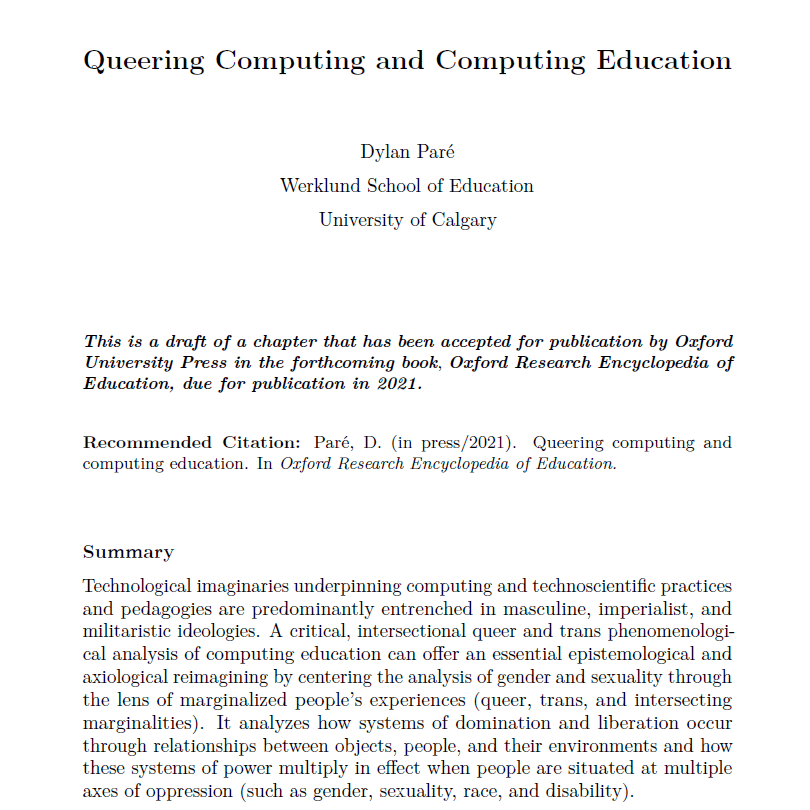
Queer Code is a design and research-based studio that designs, develops, and researches new models of code and coding with queer and trans experiences at the forefront. We explore computing at the intersections of critical theory, virtual reality, complexity, computing education, and interactive art. Our work involves developing interactive and immersive computer simulations that integrate narrative storytelling, computing, and digital art.
What We Do

Imagining new worlds and new possibilities.
Queer coding can have multiple meanings and we explore these through our design and research work at the theoretical, practical, and aesthetic levels.
Queer coding has historically referred to the sub-textual representation of queer characterization and queer symbolism in media. It is sometimes used negatively to represent villains as queer (and queerness as villainous), but has also been used to secretly represent queerness in order to find queer community and representation when queer publicness has been suppressed.
Queer coding, for us, is about engaging with these social and historical meanings as well as present day issues while designing with technologies in order to bring conversations about justice and equity, and queer and trans experiences to the forefront.
Our Values
Playful, Embodied Design
Our design work is guided by engagement with critical theory, justice and equity engaged learning through play. For more on how these can be combined, read our paper on Queering Virtual Reality: A Prolegomenon.

Intersectional, Social Justice Approach to Computing and Computing Education
We are committed to bringing attention to and addressing the histories of erasure, exclusion, and violence on queer and trans people, both by carceral technologies and algorithmic bias, and as part of the computing profession.
We aim to identify how systems of domination and liberation occur through relationships between objects, people, and their environments and how these systems of power multiply in effect when people are situated at multiple axes of oppression (such as gender, sexuality, race, and disability).
For more context, read A Critical Review and New Directions for Queering Computing and Computing Education

News
- New Paper: Restorying trans futuresI’m pleased to share that my article, “Restorying trans futures: Virtual world-becoming through VR painting and speculative storytelling,” has been published in Learning, Media and Technology and is now available online. The paper analyzes Creative Futures, a 2018 linear andContinue reading “New Paper: Restorying trans futures”
- Joining Penn State UniversityThis past August, 2023, I joined Penn State College of Education as an Assistant Professor of Learning, Design, and Technology.
- Creative Coding InterviewDylan was recently contacted by Dover Horesh, a student in the Creative Technology and Design graduate program at CU Boulder with a request to do an interview for their creative coding class. Dover asked lots of interesting questions and so we thought we’d share the conversation publicly. Includes links to resources for aspiring and emerging LGBTQ+ virtual reality developers.
- Flocking Bow Valley Debutas a beautiful day to debut our new Flocking Bow Valley exhibit on the big screen in Canmore, AB at ArtsPlace Canmore’s Festival of Art and Creativity and as part of the first Canmore Pride. 🏳️🌈🏳️⚧️
- Queer Code In the News: Gazette des Femmes – Virtual Reality in the Service of EqualityGazette des Femmes just published about virtual reality in the service of equality and Queer Code is in it! Written by Andrée-Marie Dussault, the article, La réalité virtuelle au service de l’égalité / Virtual Reality in the Service of Equality, isContinue reading “Queer Code In the News: Gazette des Femmes – Virtual Reality in the Service of Equality”
